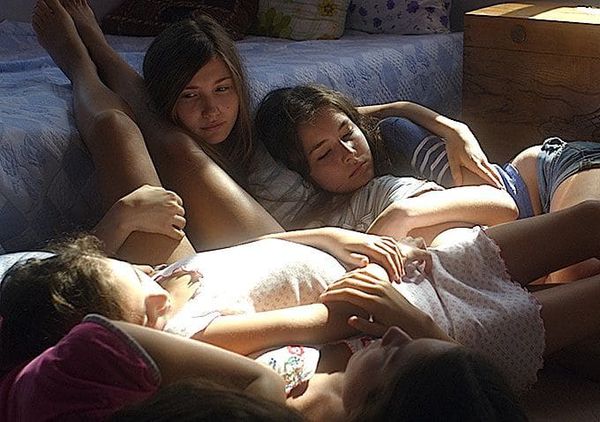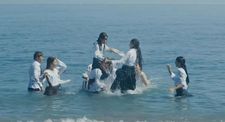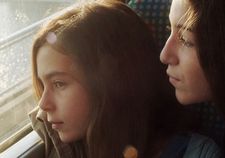 |
| The girls in Deniz Gamze Ergüven's Mustang |
After talking about working with Warren Ellis, being in a short film directed by Olivier Assayas for To Each His Own Cinema, the costumes by Selin Sozen, writing with Alice Winocour and being in Augustine, Deniz Gamze Ergüven discussed with me seeing Don Siegel's Escape From Alcatraz as an influence, the contrasting comparisons with Jafar Panahi's Offside and Sofia Coppola's The Virgin Suicides and dynamics between the girls (Günes Sensoy, Doga Zeynep Doguslu, Tugba Sunguroglu, Elit Iscan, Ilayda Akdogan) and their guardians (Nihal G. Koldas, Ayberk Pekcan) in Mustang.
Anne-Katrin Titze: The football idea, although you use it differently, reminded me of Jafar Panahi's tremendous Offside. Were you connecting that?
 |
| Mustangs in the sea: "Plus you see the sea from the window." |
Deniz Gamze Ergüven: What really triggered it was that that was such a crazy situation. For three years in Turkey we had like 45 thousand women flocking into a football game. It was just so crazy visually in terms of cinema. But of course I saw that film and I love that film.
AKT: It is great. Your situation turns it around a bit.
DGE: Yes, the thing is, in Offside it's girls who are not allowed to go into the stadium.
AKT: And in Mustang, the [women and girls] are invited. Only not those [her protagonists].
DGE: Eventually the situation is absurd, because it's gendered and it's limitative. It's very different.
AKT: I liked the cooking scenes in Mustang. You don't make them look awful, nor do you glamorize them. They are both. On the one hand, it's something domestic that they will have to do, on the other, it's fascinating to watch. Can you talk about the people teaching them? It seems like actual lessons going on.
 |
| Mustangs in the wild: "I always thought the five girls were one character with five heads …" |
DGE: Yeah. It was. It was a bit documentary, those moments, and pictorial. Sure it's beautiful, just not what they choose to do. Eventually, they divert everything they are taught for their own agenda, for an attempt at escape. For example, when they are taught to make blankets - all those skills they eventually transform.
AKT: The uncle (Pekcan) is a character who changes a lot for the audience. I'm still not sure what I saw. Is that sense of doubt on purpose?
DGE: That's because you sit at the exact same point as Lale. If you add up everything you see, it's like no doubt possible, right?
AKT: Just from his behavior? No, there are possibilities, I would say. I was not convinced what exactly happened, if he was molesting everyone from a certain point onwards and the youngest one hadn't reached that age. Is that the idea?
DGE: We see him twice go in the room. We see the grandmother (Nihal G. Koldas) discover what he's doing and saying he has to stop. For me the backstory is very clear that it's number 3 and 4. And we are exactly at the same level as Lale. Did I see what I saw?
 |
| Costume designer Selin Sozen's "shapeless shit-colored dresses" |
AKT: You say girl number 3 and 4?
DGE: Yes, Nur and Ece. It's such a huge deal in the film as well. It's such an earthquake to learn something like that. I really didn't want it to be any heavier or bigger than what it is.
AKT: And the first two, we don't know?
DGE: We don't know. But then you can feel things as well.
AKT: You never give the exact ages. The youngest one is how old?
DGE: She is 12 and a half.
AKT: And the others' ages? Were you very precise?
DGE: Yeah. It was 17, 16, 15, 14.
AKT: Hair is extremely important in this film.
DGE: I always thought the five girls were one character with five heads and arms and legs and this crazy hair. It was like a little Hydra. A lot of Turkish teenage girls would have long hair. It's something young girls value. But they always have messed up hair. It was a lot about that they were growing up without their parents. There's five of them which is overwhelming for the grandmother to look after. Yeah. It says a lot about them and their freedom.
 |
| Lale (Günes Sensoy) Nur (Doga Zeynep Doguslu): "A lot of Turkish teenage girls would have long hair." |
AKT: Do you mind the flattering comparison that is often brought up to The Virgin Suicides?
DGE: Yeah. After a while it's just like pfft. It comes out a lot and everything you just get to comment over and over and over again.
AKT: In this case simply because it's a film about a group of girls with long hair in a house?
DGE: For me there's just so many other parallels which are obvious. Like the closest film, the Escape From Alcatraz. Apart from the fact that there are five of them and there is one shot where we see them hang out in their room - for me that's where it stops. I've been asked so many times and I'm asked to comment on the same thing over and over again.
AKT: I liked the doubling of the sea scenes at the beginning and the play acting of swimming in the ocean by the two girls left in the bedroom. Did that come about as a mirror?
DGE: Those were not constructed as a payoff. Those were there, both of them. There are so many things which are pillars that hold each other.
AKT: That scene made it so obvious where they are and where they can't go. The longing for the sea.
DGE: Plus you see the sea from the window.
AKT: But they have to play swimming in it in their room.
Read what Deniz Gamze Ergüven had to say on the costumes by Selin Sozen, composer Warren Ellis and her co-writer Alice Winocour, the director of Augustine.
Oscar nominated Mustang is in theatres in the US and will screen next month at the 20th anniversary edition of London's Human Rights Watch Film Festival. The film opens in the UK on May 13.





















